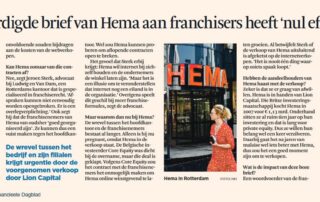Look before you leap
Franchising has enjoyed increasing interest in recent years. It has often been discussed: if the cooperation within the framework of a franchise formula works properly, then both the franchisor and its franchisees will benefit from that cooperation as a result of, among other things, an increase in scale, knowledge sharing and support and guidance with advice and guidance. deed. In practice, however, it often happens that a franchise formula is introduced in a sector that, by its very nature, is not particularly suitable for franchising.
Traditionally, franchise cooperation has been strongly represented in the retail sector and, for example, the fast food sector. Part of the concepts involved there usually consists of a strong sales formula and a fixed range, with clearly defined quality requirements. In other words, the concept and formula can be properly defined and described, so that all parties involved can clearly distill where they stand from the franchise agreement and the handbook.
Things are different with regard to some concepts and formulas. Without becoming too concrete, this may be the case, for example, with franchise formulas that focus exclusively on services. In such cases, the formula sometimes consists of no more than a protocol that must be applied by the franchisee concerned when providing its services. The service as such is entirely up to the franchisee himself and in such cases this often also applies to the services provided by the franchisee concerned. The question then is to what extent in such situations there is still an actual franchise formula that represents known and described know-how and against which a payment of franchise fee and the like can be justified. In practice, this sometimes leads to problems in such situations, in particular because the franchisees affiliated with such an organization at some point no longer recognize the added value of the organization and, as a result of their membership of that organization, only restrict their freedom. to feel.
The message of this contribution is therefore for potential franchisors to clearly ascertain in advance whether the franchise concept envisaged by the person concerned is suitable for franchising and whether the franchise organization actually offers added value to the affiliated franchisees. Before entering into a franchise agreement, the message for franchisees is to convince themselves that, as also formulated as a starting point in the European Code of Honor on Franchising, there is actually a proven formula for success.
Ludwig & Van Dam franchise attorneys, franchise legal advice

Other messages
HEMA in conflict with franchisees about e-commerce agreements
On 18 July 2018, the District Court of Amsterdam, ECLI:NL:RBAMS:2018:5098, rendered a judgment in proceedings on the merits in which the franchisees were largely ruled in favor of e-commerce.
mr. J. Sterk about HEMA conflict in the FD 18 July 2018
mr. J. Sterk about HEMA conflict in the FD.
Column Franchise+ – “Legal Franchise Statistics 2018”
The Legal Franchise Statistics have been compiled for 10 years by Ludwig & Van Dam attorneys on the basis of all published judgments of judges.
Franchisor prohibits opening (franchise) company
A franchisor applied for interim measures to prohibit a franchisee from opening a franchisee's business.
Column Snack courier no. 8: “With 7 steps you comply with the privacy law”
Much has already been written about the General Data Protection Regulation (GDPR). The law has been applicable since 25 May, but many companies have not yet had their privacy policy in order.
Forced to switch to a different franchise formula at the existing location?
If a franchise formula ceases to exist, for example if it is incorporated into another organization, the question may be whether the franchisee is also obliged to be incorporated into







